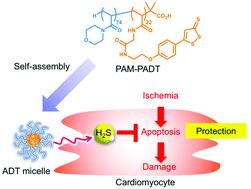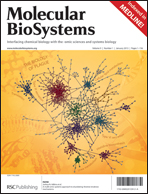Hydrogen sulfide donor micelles protect cardiomyocytes from ischemic cell death†
IF 3.743
Q2 Biochemistry, Genetics and Molecular Biology
引用次数: 14
Abstract
Hydrogen sulfide, an important gaseous signaling molecule in the human body, is known to protect cardiomyocytes from ischemia, a condition characterized by insufficient oxygen supply to the cells. Here we show that a nanosized H2S donor micelle releases H2S intracellularly and prevents cardiomyocyte apoptosis in an in vitro ischemia model.

硫化氢供体胶束保护心肌细胞免于缺血性细胞死亡†
硫化氢是人体中一种重要的气体信号分子,已知可以保护心肌细胞免受缺血,这是一种以细胞氧气供应不足为特征的疾病。在体外缺血模型中,我们展示了纳米级H2S供体胶束在细胞内释放H2S并阻止心肌细胞凋亡。
本文章由计算机程序翻译,如有差异,请以英文原文为准。
求助全文
约1分钟内获得全文
求助全文
来源期刊

Molecular BioSystems
生物-生化与分子生物学
CiteScore
2.94
自引率
0.00%
发文量
0
审稿时长
2.6 months
期刊介绍:
Molecular Omics publishes molecular level experimental and bioinformatics research in the -omics sciences, including genomics, proteomics, transcriptomics and metabolomics. We will also welcome multidisciplinary papers presenting studies combining different types of omics, or the interface of omics and other fields such as systems biology or chemical biology.
 求助内容:
求助内容: 应助结果提醒方式:
应助结果提醒方式:


